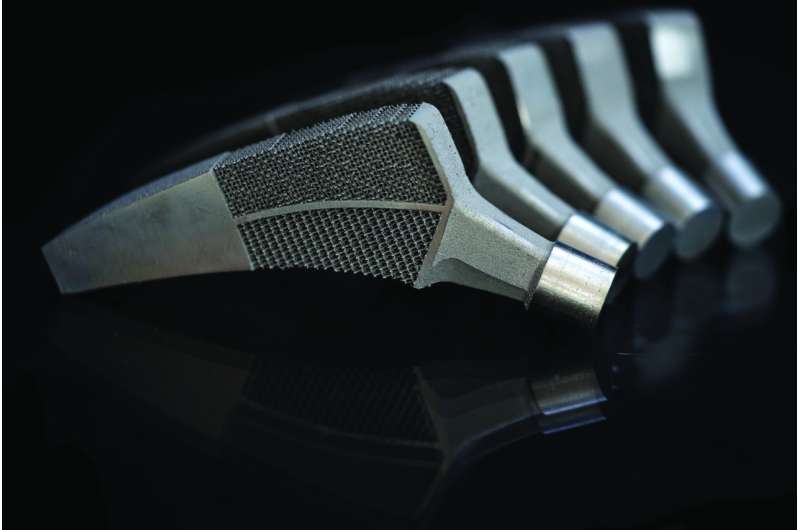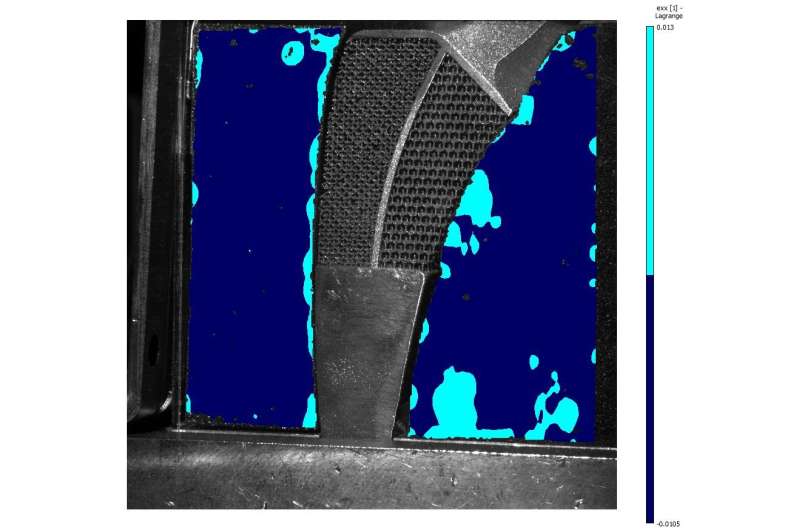Researchers develop hybrid meta-biomaterial that can prolong lifespan of hip implants

A hybrid meta-biomaterial that promotes bone growth is not something you will find in nature, but it can be created using a 3-D printer and existing biomaterials. TU Delft researchers have developed a meta-implant that combines a conventional meta-biomaterial with an auxetic meta-biomaterial. Unlike natural materials, auxetics have a negative Poisson's ratio—when stretched, they become thicker perpendicular to the applied force. The material may therefore be used in hip implants to ensure their long-term fixation. The TU Delft researchers published their findings in the scientific journal Materials Horizons on 2 January 2018.
Around the year 2020, the number of hip prostheses around the world is expected to rise to 2.5 million a year. Using the current technology, about 10 percent of these implants will no longer be firmly fixated 10 years after surgery. This inspired TU Delft Professor Amir Zadpoor to find a means of preventing implant loosening. Zadpoor now believes that he has found a solution using an auxetic meta-biomaterial.
Meta-biomaterials are the biomedical variant of so-called metamaterials, materials that display characteristics that are not found in nature. In their publication, Zadpoor and his colleagues outline the immense potential of metamaterials in the development of medical implants. "Auxetic meta-biomaterial, designed using simple geometry and printed in titanium, displays the unique mechanical property of expanding when put under pressure. This makes it ideal for use alongside materials that do the opposite," explains Zadpoor. "When someone with a hip implant walks, the prosthesis is subjected to various forces. If too much pressure develops on one side of the prosthesis, it can become detached from the bone, which is extremely undesirable."
The researchers believe that a hybrid prosthesis made of meta-biomaterials with a positive Poisson's ratio and those with a negative Poisson's ratio will become much more fixated in the body. "This will significantly improve the chances of bone growth onto the hybrid meta-biomaterials, holding the implant much more securely in place." Zadpoor also thinks that he will be able to use this new material in the future to address the most significant cause of implant loosening. "Since there will be fewer unnatural forces at work on the prosthesis, there is a smaller chance of plastic particles wearing off in the hip cup, which can increase the risk of loosening."
Zadpoor's experiment involved a vertical compression on an implant surrounded by bone-like material (special foam with the mechanical properties of bone). The force simulates the stress exerted on an implant in the human body. As a result of this pressure, the new implant expands, resulting in compression in the surrounding bone on both sides (the turquoise colouration seen in the above image). It is exactly this compression that can ensure improved implant fixation. Clinical trials are yet to be conducted. In the years ahead, the primary research question of the Delft group – who will be working in collaboration with researchers from various academic hospitals – concerns how exactly these properties can be used to develop better implants.

"Innovation in the field of hip implants is badly needed, and Professor Zadpoor's new method certainly has the potential to prolong the lifespan of implants. A phased introduction starting with 3-D measurements of this implant in patients will be necessary in order to guarantee the safe improvement of quality for patients," says Professor Rob Nelissen, Medical Delta Professor and orthopaedic surgeon at the Leiden University Medical Centre.
The paper, "Rationally designed meta-implants: a combination of auxetic and conventional meta-biomaterials," was published in the Royal Society of Chemistry's peer-reviewed journal Materials Horizons.
More information: Helena M. A. Kolken et al, Rationally designed meta-implants: a combination of auxetic and conventional meta-biomaterials, Materials Horizons (2017). DOI: 10.1039/c7mh00699c
Provided by Delft University of Technology





















